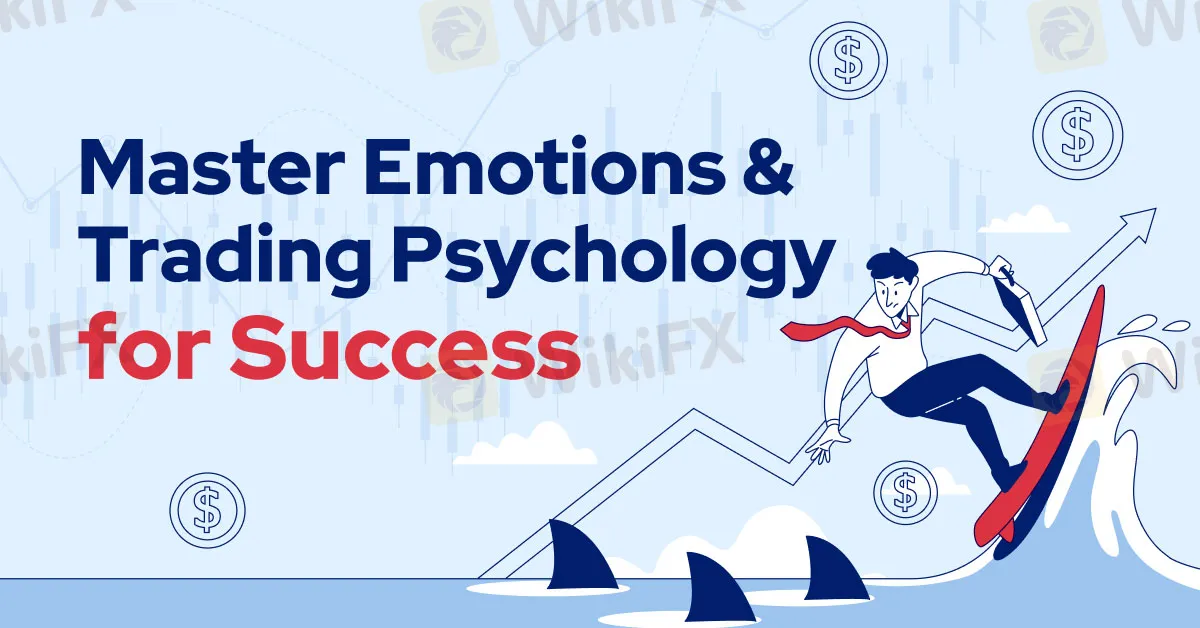简体中文
繁體中文
English
Pусский
日本語
ภาษาไทย
Tiếng Việt
Bahasa Indonesia
Español
हिन्दी
Filippiiniläinen
Français
Deutsch
Português
Türkçe
한국어
العربية
Master Emotions & Trading Psychology for Success
Abstract:Trading in the dynamic and often unpredictable worlds of Forex and cryptocurrencies requires more than just technical analysis and market knowledge. It demands a mastery of emotions and a deep understanding of trading psychology. In this article, we will explore the critical role emotions play in trading and strategies to navigate them for lasting success in the financial markets.

Trading in the dynamic and often unpredictable worlds of Forex and cryptocurrencies requires more than just technical analysis and market knowledge. It demands a mastery of emotions and a deep understanding of trading psychology. In this article, we will explore the critical role emotions play in trading and strategies to navigate them for lasting success in the financial markets.
Emotions, particularly fear and greed, are integral components of the human experience and can significantly impact trading decisions. Fear may lead to hesitation or avoidance of necessary risks, while greed can foster impulsivity and excessive risk-taking. Acknowledging these emotions and learning to manage them is crucial for any trader aiming to thrive in the ever-changing landscape of financial markets.
One of the primary emotions that traders grapple with is fear. Fear of loss, fear of missing out (FOMO), and fear of making the wrong decision can cloud judgment and lead to suboptimal choices. To master fear, it's essential to have a well-defined trading plan. This plan should include entry and exit points, risk tolerance, and profit targets. When armed with a clear strategy, traders can navigate uncertainties with greater confidence, reducing the impact of fear on decision-making.
Another emotion that often influences trading is greed. The desire for quick profits can lead to impulsive actions and excessive risk-taking. Traders should cultivate discipline and patience to counteract greed. Setting realistic profit expectations and adhering to a risk management plan are effective ways to temper the influence of greed. By focusing on consistent, controlled gains rather than chasing elusive windfalls, traders can build a sustainable and resilient trading approach.
Understanding the psychological concept of loss aversion is vital for successful trading. Loss aversion refers to the tendency of individuals to feel the pain of losses more intensely than the pleasure of gains. Traders must learn to accept losses as a natural part of the process and not let them dictate emotional responses. Implementing stop-loss orders and embracing a mindset that views losses as learning opportunities rather than failures can help overcome the detrimental impact of loss aversion.
Patience is a virtue in trading, and impatience can be a significant barrier to success. The fear of missing out on potential profits can lead to premature entries into trades or staying in positions longer than necessary. To counteract impatience, traders should wait for optimal setups, trust their analysis, and avoid chasing the market. Patience allows for a more selective and disciplined approach to trading, minimizing unnecessary risks.

Maintaining a balanced emotional state during periods of market volatility is paramount. Extreme market conditions can trigger emotional responses, leading to irrational decision-making. Successful traders develop resilience and emotional intelligence to stay focused during turbulent times. Regular self-reflection, mindfulness practices, and stress management techniques can contribute to maintaining a composed and rational mindset under pressure.
Continuous learning is fundamental in the ever-evolving landscape of financial markets. Traders should invest time in expanding their knowledge of both market dynamics and trading psychology. Books, online courses, and mentorship programs are valuable resources to enhance trading skills and develop a deeper understanding of the psychological aspects of trading.
In conclusion, mastering emotions and trading psychology is a continuous journey for any trader seeking sustainable success in the Forex and crypto markets. By acknowledging and understanding emotions, implementing disciplined strategies, and embracing continuous learning, traders can navigate the complexities of the financial markets with confidence and resilience. Remember, successful trading is not just about analysing charts; it's about mastering the art of self-control and emotional intelligence.

Disclaimer:
The views in this article only represent the author's personal views, and do not constitute investment advice on this platform. This platform does not guarantee the accuracy, completeness and timeliness of the information in the article, and will not be liable for any loss caused by the use of or reliance on the information in the article.
Read more

Israeli Businessman Arrested in Morocco Over Forex Fraud
An Israeli businessman faces extradition to Germany after his arrest in Morocco, charged with defrauding German investors in a forex scam. Interpol issued the arrest warrant.

Never Heard of Dynasty Trade? Here's Why You Should Be Worried
Have you heard this name before? No , it’s time you do because staying unaware could cost you. This platform is currently active in the forex trading and has been linked to several suspicious activities. Even if you’ve never dealt with it directly, there’s a chance it could reach out to you through ads, calls, messages, or social media. That’s why it’s important to know the red flags in advance.

Want to Deposit in the EVM Prime Platform? Stop Before You Lose It ALL
Contemplating forex investments in the EVM Prime platform? Think again! We empathize with those who have been bearing losses after losses with EVM Prime. We don't want you to be its next victim. Read this story that has investor complaints about EVM Prime.

WEEKLY SCAM BROKERS LIST IS OUT! Check it now
If you missed this week's fraud brokers list and are finding it difficult to track them one by one — don’t worry! We’ve brought together all the scam brokers you need to avoid, all in one place. Check this list now to stay alert and protect yourself from fraudulent brokers.
WikiFX Broker
Latest News
Global week ahead: Crunch time for trade talks as Trump's deadline nears
Top Wall Street analysts recommend these dividend stocks for regular income
Stock futures rise as U.S.-EU trade deal kicks off a hectic week for markets: Live updates
Samsung Electronics signs $16.5 billion chip-supply contract; shares rise
Does XS.com Hold Leading Forex Regulatory Licenses?
European stocks set to rise after the U.S. and EU strike trade agreement
Elon Musk confirms Tesla has signed a $16.5 billion chip contract with Samsung Electronics
Chile Bumps Up Copper Price Forecast and Flags Lagging Collahuasi Output
EU chief to meet Trump in Scotland in push to avoid a transatlantic trade war
Anglo American Q2 2025 Production: Copper and Iron Ore Excel
Currency Calculator


